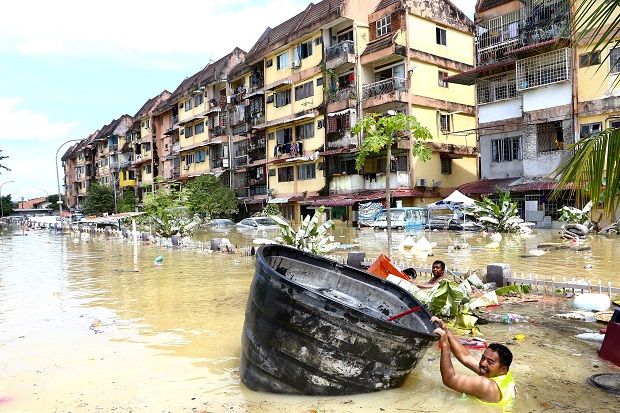
SOCIAL media has been a boon and bane to those stricken by last week’s floods, which crippled many parts of Selangor, especially ground zero Taman Sri Muda.
Affected residents took to various platforms to capture their plight and desperation while stuck on the rooftop of their submerged homes.
Many shared their details on WhatsApp to seek help as it began to dawn on them that help from the authorities wasn’t forthcoming.
I received an SOS from a family of seven who had run out of food and feared their phone battery would soon go flat.
As darkness fell, their worries turned to desperation as many of us in the media collectively sought ways to rescue them.
I called up an official of the Selangor state government and was told about the “shortage of assets” of the authorities. That simply meant there weren’t enough boats and personnel.
But non-governmental organisations and the public seemed to be able to swing into action as they mobilised themselves effectively, despite having less resources than the government.
That these volunteers could react faster probably angered most Malaysians over the disorganised, if not incompetent, operations of the various government agencies.
Adding insult to injury, the heads of some agencies sounded defensive and insisted they had done their work.
Their indifference probably made matters worse for those who have lost their belongings, and even loved ones.
Social media has enabled us to be at the scene of affected areas, and it helped the media understand the predicament of the victims, with one or two people even displaying their anger at certain politicians.
The antics of some politicians – including those travelling in convoys with accompanying police outriders blaring their siren – were all captured on videos that went viral.
The best part of it was the clear audio of the residents making their cynical remarks on these politicians. It was all raw and brutal, and Malaysians enjoyed every bit of the sound bites.
I don’t think our television stations could manage these uncensored and unfiltered footage.
The floods must have been a nightmare for our elected representatives. If they showed up, they were accused of seeking glory, especially those accompanied by the obligatory entourage of reporters and aides.
If they didn’t, they risked being accused of having gone missing in action. And if they had been working at ground zero from day one without registering their presence, they’d end up being branded absentees.
Then, those who sent boxes of food and other essential items with pictures of their faces pasted on them became the favourite targets of Malaysians, with many expressing their contempt on social media.
The lesson for elected representatives is there’s nothing wrong with them registering their charity, but it’s a big turn off when their A3 size picture is on every package.
But most politicians are narcissistic as they love the sight and sound of their own faces and voices, so it’s most unlikely that they’ll learn from the resentment on the ground. In the first place, are they even aware?
To be fair, some Yang Berhormat have proven that they’re Yang Bekerja, particularly those who got down and dirty to clean people’s homes, with one or two even going barefoot.
A few were clearly photo opportunities set up by their media officers for the benefit of their two-minute appearance on television. By now, many Malaysians can gauge the sincerity of these politicians. Truth be told, they looked out of place and even awkward.
Thanks to Tik Tok, Facebook and Instagram, Malaysians have been able to share these video clips as well as express their views without the necessity for media coverage.
From nitwit politicians to religious bigots, no one was spared as Malaysians poured scorn on them while heaping praise and encouragement on their countrymen and women who rose to the occasion to help each other, regardless of race.
Indian youths turned up to clean a mosque, an Indian family cooked for the residents and Malay women joined Sikhs to prepare vegetarian food at a temple. And Malays helped an old Chinese aunty from a roof while Chinese volunteers helped mop up the homes of the predominantly Malay families at Taman Sri Muda.
But the best visual was of an Indian woman who posted a video clip expressing her admiration for fellow Malaysians as the Negaraku played stirringly as background music, which made for an uplifting experience.
The message of Malaysians is loud and clear – the politicians and authorities let us down badly.
Instead of bickering about who should take charge of the respective committees, the politicians should be aware that the public couldn’t care less about this. And so far, these MPs haven’t executed their responsibilities effectively.
It’s obvious that the army must now be mobilised and deployed in greater numbers when such disasters happen again. In many countries, the army is plainly visible in these areas.
The weather has changed dramatically because of climate change. Only an inefficient minister can tell us that Malaysia is one of the few countries in the world not affected by climate change.
The fact is that temperature records in Malaysia have indicated a spike, resulting in precipitation that may cause droughts and floods in various coastal areas as well as threaten Malaysia’s natural resources.
Malaysia remains vulnerable to floods, landslides, haze and water pollution, and the statement by our Environment and Water Minister Tuan Ibrahim Tuan Man is totally off the mark.
And for sure, last week’s floods, while more devastating than usual, was not a once-in-100 years incident. Just look up the number of similar excuses offered by officials in previous floods.
It’s also foolish to delete critical comments on Twitter since the government should be using this popular platform to disseminate information and help the people.
Our politicians and officials need to come up with better and more convincing lines, or er, excuses.





